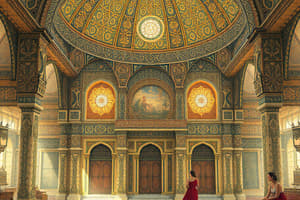Podcast
Questions and Answers
Which city-state is known as the birthplace of democracy?
Which city-state is known as the birthplace of democracy?
- Corinth
- Sparta
- Athens (correct)
- Thebes
What significant military conflict occurred between 431 and 404 BCE?
What significant military conflict occurred between 431 and 404 BCE?
- Battle of Thermopylae
- Persian Wars
- Peloponnesian War (correct)
- Syrian Wars
What was a major contribution of the Persian Empire in terms of administration?
What was a major contribution of the Persian Empire in terms of administration?
- Implementation of direct democracy
- Creation of a system of city-states
- Establishment of satrapies (correct)
- Development of a feudal system
Which religion emphasizes dualism and the struggle between good and evil?
Which religion emphasizes dualism and the struggle between good and evil?
What role did the Silk Road play in the development of empires?
What role did the Silk Road play in the development of empires?
Study Notes
Ancient Greece
- Location: Southeastern Europe along the Aegean Sea.
- City-States: Major political units included Athens, Sparta, Corinth, and Thebes.
- Culture:
- Birthplace of democracy (Athens).
- Significant advancements in philosophy (Socrates, Plato, Aristotle).
- Rich tradition in arts, theater, and science.
- Military Conflicts:
- Persian Wars (499-449 BCE): Notable battles include Marathon and Thermopylae.
- Peloponnesian War (431-404 BCE) between Athens and Sparta.
- Legacy: Influenced Western civilization, governance, philosophy, and art.
Persia
- Location: Modern-day Iran; a vast empire at its height.
- Dynasties: Major dynasties included the Achaemenid, Parthian, and Sasanian.
- Administration:
- Known for its efficient bureaucracy and road systems (Royal Road).
- Satrapies: Provinces governed by satraps for local administration.
- Cultural Contributions:
- Zoroastrianism: Major religion emphasizing dualism and the struggle between good and evil.
- Art and architecture: Notable for palaces, reliefs, and intricate designs.
- Military Conflicts:
- Persia expanded through conquests into Egypt, Asia Minor, and parts of India.
The Silk Road
- Definition: Ancient trade routes connecting East and West, facilitating commerce and cultural exchange.
- Geography: Spanned from China to the Mediterranean, covering diverse terrains.
- Trade Goods:
- Key exports from the East: Silk, spices, tea, and porcelain.
- Western exports: Glassware, wool, and precious metals.
- Cultural Exchange:
- Spread of religions: Buddhism, Zoroastrianism, and later Islam.
- Exchange of ideas: Philosophy, art styles, and technology (e.g., papermaking).
- Impact on Empires:
- Promoted economic prosperity and interconnectedness between Greece, Persia, and beyond.
- Played a role in the rise and fall of various civilizations through trade and cultural diffusion.
Ancient Greece
- Located in Southeastern Europe along the Aegean Sea.
- Composed of independent city-states, with prominent examples including Athens, Sparta, Corinth, and Thebes.
- Birthplace of democracy, particularly in Athens.
- Made significant contributions to philosophy, with influential figures like Socrates, Plato, and Aristotle.
- Flourished in arts, theater, and science.
- Experienced major military conflicts, including the Persian Wars (499-449 BCE) with notable battles like Marathon and Thermopylae.
- Also engaged in the Peloponnesian War (431-404 BCE) between Athens and Sparta.
- Legacy continues to influence Western civilization in areas like governance, philosophy, and art.
Persia
- Located in modern-day Iran, with a vast empire during its peak.
- Ruled by prominent dynasties, including the Achaemenid, Parthian, and Sasanian.
- Known for its efficient bureaucracy and extensive road systems like the Royal Road.
- Employed satrapies, provinces governed by satraps for local administration.
- Made significant cultural contributions, including the development of Zoroastrianism, a major religion emphasizing dualism and the struggle between good and evil.
- Renowned for its art and architecture, featuring palaces, reliefs, and intricate designs.
- Expanded through conquests into Egypt, Asia Minor, and parts of India.
The Silk Road
- Ancient network of trade routes connecting East and West, facilitating commerce and cultural exchange.
- Spanned from China to the Mediterranean, traversing diverse terrains.
- Facilitated trade of various goods, including silk, spices, tea, and porcelain from the East, and glassware, wool, and precious metals from the West.
- Played a vital role in the spread of religions like Buddhism, Zoroastrianism, and later Islam.
- Exchanged ideas in areas like philosophy, art styles, and technology, including the introduction of papermaking.
- Contributed to the economic prosperity and interconnectedness of empires like Greece, Persia, and beyond.
- Influenced the rise and fall of various civilizations through trade and cultural diffusion.
Studying That Suits You
Use AI to generate personalized quizzes and flashcards to suit your learning preferences.
Description
Explore the key aspects of Ancient Greece and Persia, including their locations, city-states, military conflicts, and cultural contributions. Learn about the birth of democracy in Athens, significant advancements in philosophy, and the vast empire of Persia. This quiz delves into the legacies that have influenced Western civilization.




